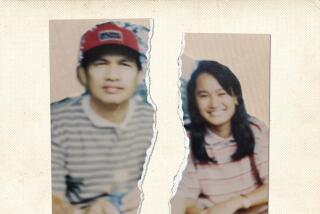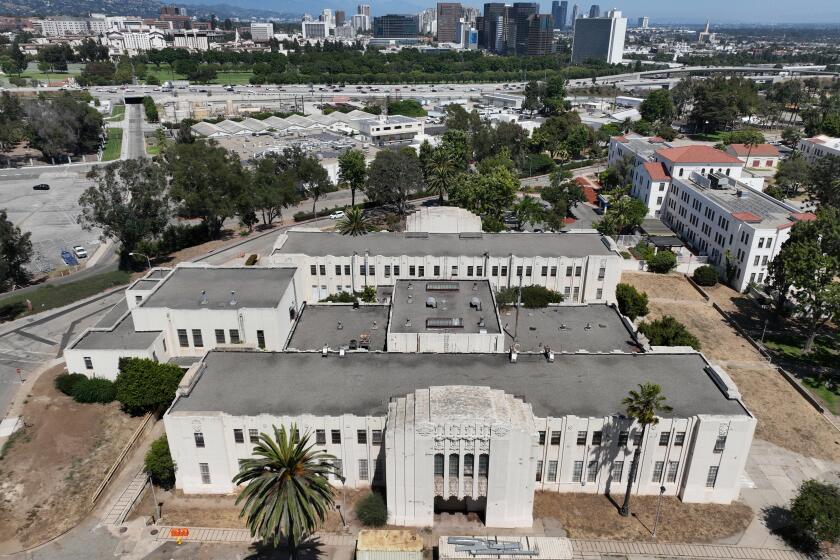Justice Triumphs -- Finally
On his first morning of freedom after serving 24 years in prison for a murder he didn’t commit, Tom Goldstein headed for the one place he felt comfortable -- a law library.
As an inmate, Goldstein spent thousands of hours in prison law libraries throughout California researching cases and statutes that eventually led to his release earlier this year.
“The library was my one comfort in prison, no matter how bad things got,” said Goldstein, 55. “I felt I was very different than most of the people in prison. It was difficult.”
Now working as a paralegal, he finds comfort in the same law books and in the new life he is forging. His remarkable path to freedom has made him a celebrity of sorts, a source of inspiration for prisoners across California and an example of how religion sustains people when there seems to be little reason for hope.
Two weeks ago, Goldstein also sued the officials he believes are responsible for his wrongful 1980 murder conviction, which was based largely on the testimony of a notoriously unreliable jailhouse informant and an eyewitness who later recanted.
Since his release last April, he has given a speech at the Simon Wiesenthal Center in Los Angeles, met with the president of the Southern California branch of the American Civil Liberties Union and even visited a federal appeals judge in his Pasadena chambers.
Goldstein, who said his Jewish faith played a major role in sustaining him throughout his lengthy incarceration, also participated in his first Seder in a quarter of a century and carried the Torah at a Yom Kippur service at Beit T’Shuvah, a synagogue in West Los Angeles.
Goldstein has become particularly close to the lawyers who now represent him. The first clothes he wore upon his release were borrowed from attorney David McLane. Attorney Ron Kaye took him for his first meal hours after he walked free. They went for beer and tacos at La Parrilla in Boyle Heights.
Since then, Goldstein went home to a family reunion in Kansas and saw siblings for the first time in 25 years. He also cast a ballot for president for the first time since 1976: “I have yet to vote for a candidate who won,” he said.
Goldstein drives a used Ford bearing the bumper sticker “Practice Random Acts of Kindness” and regularly uses a laptop computer and a cellphone.
But his life still has a tentative quality, he said. Goldstein is living with a family who agreed to take him in because they were friends of Kaye. And Goldstein readily acknowledges that he is still learning to cope on the outside.
“It’s a little hard adjusting socially. It’s hard to trust people,” he said. He also said he still fears the Long Beach police.
“In some respects, I still feel like I’m in prison,” said Goldstein, emphasizing that he is wary of going out at night.
To help stay on track, Goldstein continues to meditate -- a practice he began more than 20 years ago in prison -- and has made friends at the Transcendental Meditation Center in Beverly Hills.
“I really have to give credit to the TM program. It changed my life,” he said. Goldstein said that since he started meditating, “when something stressful happens, it doesn’t overwhelm you.” He said TM has “helped take the focus” off his bitter feelings.
He is angry about what happened to him, but he carries it softly, according to people who have met him. Among them is Rabbi Yitzchak Etshalom, director of Project Next Step at the Simon Wiesenthal Center.
Goldstein spoke at one of Next Step’s meetings in September. The rabbi said Goldstein told the audience how “his faith gave him the strength to continue. People were very impressed by his lack of bitterness and the acceptance he has developed within himself.”
Asked if he could forgive the people who were responsible for his wrongful imprisonment, Goldstein replied, “At the very least, I’d like an apology. When I receive their apology, I’d probably be willing to forgive them.”
Goldstein sued four former Long Beach police officers in federal court in Los Angeles late last month. His lawyers assert that the officers violated his civil rights by helping a jailhouse informant concoct a story that Goldstein confessed to a 1979 murder. The suit also contends that the officers improperly influenced an eyewitness to testify against Goldstein.
Years later, the witness recanted. Goldstein is seeking damages from the police officers, two Los Angeles County prosecutors, the county and Long Beach.
Goldstein is armed with rulings from five federal judges that his constitutional rights were violated during his trial. The judges concluded that police and prosecutors failed to tell the defense that the key eyewitness had doubts about the identification of Goldstein and that they had given significant benefits to the jailhouse informant in return for his testimony.
*
Thomas Lee Goldstein moved to Long Beach in his mid-20s after graduating from high school near Kansas City and serving three years in the Marine Corps, including time in Vietnam.
By his own admission, Goldstein had been a lackluster student. As he grew older, he decided he might want to be a mechanical engineer and enrolled at Long Beach City College to study chemistry and physics.
Goldstein lived in an $85-a-month efficiency apartment for three years. Then, after being evicted on Nov. 1, 1979, he moved into a garage where he installed a bed and a hot plate. Along the way, he had acquired a minor criminal record -- two convictions for drunkenness and one for disturbing the peace. Two nights after Goldstein moved into the garage, and just yards away, John McGinest was killed by four shotgun blasts.
“I never knew McGinest,” Goldstein said. “I didn’t know anything about this killing until the police came to my garage.” Police searched his place and found nothing relevant.
Goldstein agreed to take a polygraph test. The results were inconclusive. He was arrested.
Police never found the shotgun. No blood, fingerprints or other physical evidence was found to link the victim to Goldstein.
What happened next stunned him. The prosecution case against Goldstein rested on two witnesses -- jailhouse informant Edward F. Fink, who had a heroin habit and testified against 10 cellmates in return for deals on some of his 35 arrests -- and eyewitness Loran Campbell.
Fink said Goldstein confessed to him while they briefly shared a cell. Goldstein said it was a lie. Campbell said he thought Goldstein was the man he saw running by his apartment house carrying a rifle at the time of the murder. Several other eyewitnesses said the killer was black or Mexican American and larger than Goldstein.
Goldstein was flabbergasted when a jury found him guilty of murder and sentenced him to 27 years to life.
“I was shocked.... Even when I was sentenced, I said to my attorney, ‘Are they really sending me to prison?’ ” he recalled in a lengthy interview.
Goldstein soon became an itinerant in the California prison system, spending time in Chino, San Quentin, Folsom, Soledad, Solano, Tehachapi and Pleasant Valley, among other institutions.
He was small and he was Jewish, which made him vulnerable in an environment where, he said, “there were just a handful of Jewish prisoners” and a lot of “hate Jews” sentiment.
He was periodically accosted about his ethnicity, particularly after he tattooed a Star of David on his left arm.
“I had a siddur,” a Hebrew prayer book, he said. “I am what I am. I saw Jewish guys who had swastikas because they wanted to fit into the environment. I didn’t want to fit in.”
Goldstein said he did not back down, other than occasionally covering his tattoo with a shirt to avoid confrontations with neo-Nazis. He said some potential adversaries stayed away from him because they “respected the crime: murder.”
His initial appeals received cursory denials.
“That’s when I realized I would have to do” a lot of work on the case, he said, “if I was ever going to get out.”
After he spent nearly a decade in prison, a dramatic development in the outside world created new legal possibilities for Goldstein. In 1990, the Los Angeles County Grand Jury issued a report documenting widespread use by prosecutors of false testimony by jailhouse informants between 1979 and 1990.
Armed with that issue, Goldstein filed a new challenge to his conviction. One federal judge turned him down, but the U.S. 9th Circuit Court of Appeals agreed to give him a hearing.
“I did the oral argument by phone from Tehachapi,” he said. “I did a really terrible job.”
A year later, his plea was rejected. At that point, it appeared that Goldstein had run out of legal challenges. Then one day in the mid-1990s, he recalled, “someone on the prison yard said, ‘Maybe you could get some pro bono assistance.’ ” So Goldstein wrote to his original attorney, who said he couldn’t help him but referred him to another lawyer.
Eventually, he got to a lawyer who knew a lot about Edward Fink and had reports from various law enforcement officials. One corrections officer said Fink was a “con man who tends to handle the facts as if they were elastic.” A deputy district attorney said simply, “Fink is a fink.”
Armed with that information, Goldstein submitted another legal challenge. He vaulted the tough hurdle of winning the right to have a second habeas corpus petition considered, and the federal public defender’s office was appointed to represent him.
Terry Rearick, the office’s chief investigator, tracked down the eyewitness Loran Campbell, who recanted his testimony. All this material was presented by public defender Sean Kennedy to U.S. Magistrate Judge Robert N. Block in Los Angeles.
In November 2002, Block recommended that Goldstein’s conviction be overturned, saying evidence presented to him “unquestionably undermines confidence in the verdict.”
U.S. District Judge Dickran Tevrizian later affirmed that conclusion, as did a three-judge panel of the U.S. 9th Circuit Court of Appeals last December. Still, it was four more months before Goldstein was freed.
One of the first jobs Goldstein got after being released was working for Pasadena attorney Dan Stormer on a federal case challenging conditions in Orange County jails.
“He clearly is very bright, and he clearly was very injured by prison,” Stormer said. “There is a psychic harm that envelops him. You can almost feel the pain of losing 24 years of your life. It is palpable.”
Nonetheless, Goldstein is optimistic. He hopes to win his lawsuit with a big enough damage award so that he can return to the Midwest and start a new life.
“I want to own a large piece of land and raise fish,” he said. “I think I have developed a way to raise fish with no mercury. If I can do that, it would be interesting to me.”
After spending years in cramped prison cells, Goldstein said, he longed for open spaces to enjoy some of life’s pleasures at his own pace.
“I want to have a place of my own,” he said, “to sit out and listen to Janis Joplin, the Doobie Brothers and the Grateful Dead.”
More to Read
Sign up for Essential California
The most important California stories and recommendations in your inbox every morning.
You may occasionally receive promotional content from the Los Angeles Times.










